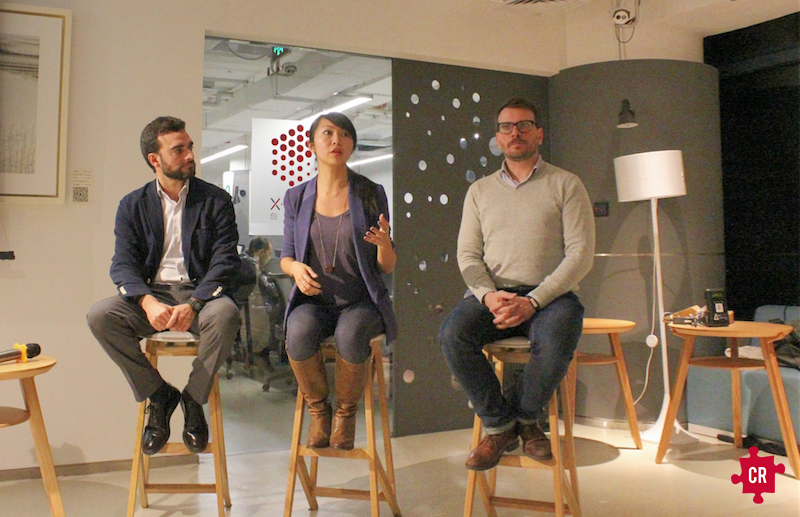Attempting to provide solutions to China’s sustainability challenges can often require a unique approach; particularly when a series of environmental, social and economic systems are involved. Yet increasingly, innovators are building technologies which present creative and tangible solutions to issues like air quality and pollution, food safety and equitable economic opportunities. As the size and complexity of these challenges have grown, so too has the need for these problem-solving innovators and their technologies.

On April 26 in Shanghai at our ‘Beyond Business As Usual’ forum, Collective Responsibility welcomed three problem solvers who spoke about the technologies they were funding, building and scaling in order to meet the sustainability challenges they saw as most pressing.
Matilda Ho, Co-founder & CEO at YIMISHIJI shared her thoughts about the widening separation between Chinese consumers and the food they eat, referencing her own experience as an uninformed eater. In response, she began to engage people around locally sourced, sustainably grown produce, developing an online ordering and educational platform in the process. In a matter of 100 days, Matilda and her team built a minimum viable product (MVP) e-commerce platform, which has now connected over 10,000 users with around 40 organic farms across Shanghai.
Stefan Berder, Co-founder & CEO at gams spoke about the ignorance of many building occupants and the air they breathe. In his own quest to make homes and offices more livable, he invented a monitor that measures and reports levels of indoor air pollutants. With customers located across Asia, Stefan has developed a solution to help businesses create healthier, more productive work environments.
Miguel Solana, Head of Innovation at Santander-Bank of Shanghai explained the disconnect between traditional banks and non-typical customers such as university students. With a commitment to higher education, Santander has created over 1,200 university partnerships globally, funding projects, research and internships. Technology comes in where these beneficiaries have been traditionally left out. Miguel explained that because of advancements in big data, loans and financial services are more easily serviced to those without credit history and allowing people to gain services previously unattainable.
For each speaker, the mission for which they set out and the technology that guided them helped to close these sustainability gaps, build awareness and improve lives. Both the presentations they delivered and the conversations that ensued lent a few valuable takeaways that all can learn from.
- Make as many mistakes as you can early on and embrace learning very quickly. Those that are the most successful have often learned things the hard way. It is how quickly you react to these mistakes that moulds the business and you as an entrepreneur.
- While you may be creating a technology based product, do not forget its social application. You won’t sell anything unless you have a compelling proposition to customers and are tackling a challenge they perceive to be real. As Stefan put it bluntly, people don’t care about air quality, but they do care about employee wellness, productivity and air filtration efficiency.
- Building partnerships and community relationships alongside technology is essential for scaling sustainability. Look at your market, the beneficiaries of your product or service and start making connections. No matter how good your technology is, your network is still one of your greatest assets.
- Money shouldn’t be the sole objective of your technology driven sustainability mission. However, if you don’t make money, it’s near impossible to scale your impact. So make sure you sure to constantly test and expand your market to make sure revenue is coming through the door – but do not sell out your values.
- Stay focused on your mission. As you build your first working concept or prototype, do not stray from your initial goals. Once they get going, sometimes people want to try to solve every problem, but must instead focus on building the first MVP to the best achievable level.
China’s sustainability innovators hold the technological key for unlocking some of the most problematic issues and most lucrative business opportunities. Technological development is reaching a point in which much of the innovation and idea creation is aligning more and more with aspects of social, environmental and economic sustainability and we at Collective Responsibility see real opportunity in this area. For all who wish to innovate to disrupt and think technology can play a part, we invite you to reach out to us, our speakers or attend one of our next events and start the conversation.
To get in touch please email Charlie Mathews ([email protected]) or Yuxin Wang ([email protected]).
